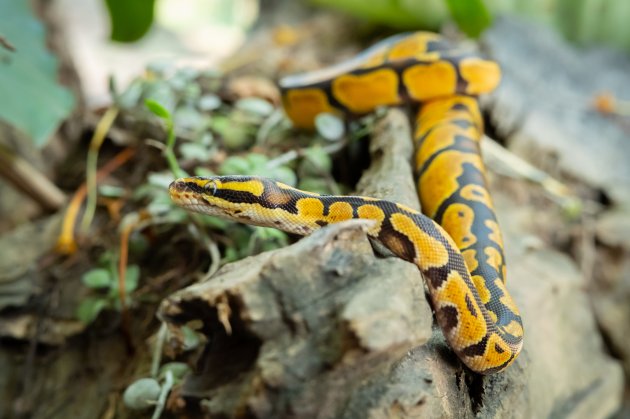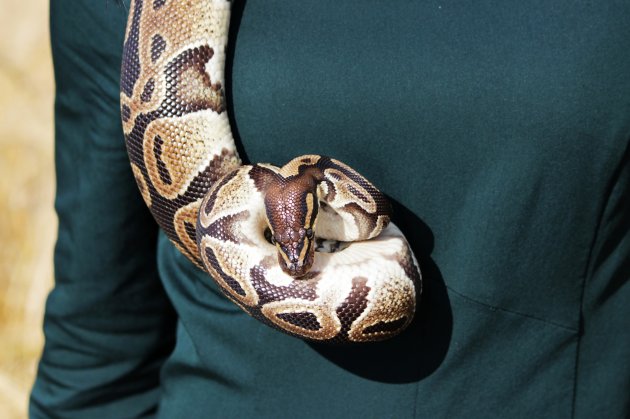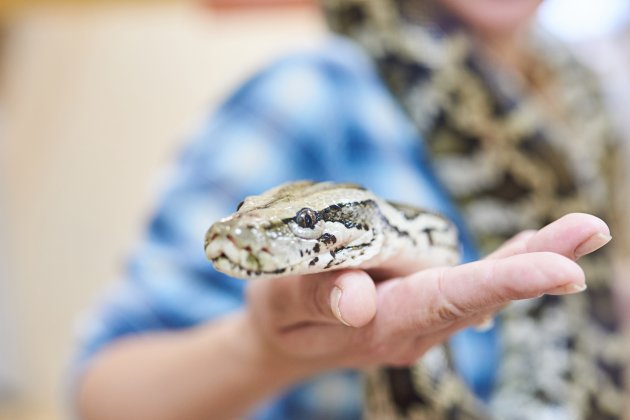The ball python, also known as the royal python, is the most adopted pet python around the world for several reasons.
For one, they are beautiful, and they come in various beautiful patterns and colors. Ball python breeders are continually creating an array of color and pattern variations, and this keeps attracting more people.
Second, ball pythons thrive perfectly in captivity, better than any other pythons. Again, they are small in size, very friendly, and easy to care for. As such, they make the best python pet for first-timers, and once you take on down this road, most people don’t quit.

Lastly, acquiring a ball python is easy as they are readily available in pet stores, reptile expos, reptile breeders, and even in online reptile shops.
However, despite it seeming like a walk in the park, you shouldn’t just get a ball python blindly. There are a few questions to ask yourself before you adopt a ball python. They include:
1. Is the ball python the best type of pet reptile for me?
The real question here is, “have you done enough research on snakes and specifically the ball python?” You see, just like any other animal, snakes are so diverse. Thus, before adopting a ball python, you must do enough research about snakes in general and ball pythons specifically. Once you are sure that this is what you want, then you can confidently go for it. See how ball pythons are as pets.
2. Do I have the budget to take care of a ball python perfectly?
Apart from feeding and housing your ball python, you might need to visit a vet every once in a while, assuming it has no health issues, for routine checkups. Now, this will require some money, and you need to have an estimated figure in mind and know if you will be able to afford it. The last thing you want is to adopt a ball python, then watch its health deteriorate or be forced to give it up for adoption because you can no longer meet its needs.
3. Am I able to care for a ball python for a long term?
Ball pythons have a long life span, so you will be signing up for a long term commitment. As such, you need to be sure that the love you have for ball pythons is not temporary. And, you should be sure that things won’t change even if your pet develops health issues or any other unpleasant issues.
4. Is my living environment ideal for a ball python? Think heat and humidity requirements.
For your ball python to thrive and grow in good health, the environment has to favor it. Research on heat and humidity requirements for a ball python and also how you should maintain the humidity. This will also help you prevent any health issues that might arise as a result of housing the python in the wrong environment.

5. What does the specific ball python eat, and how frequently?
Generally, ball pythons are low maintenance compared to most pets, but you need to know that you can find and afford whatever the specific python you want to adopt eats. Again, you need to know how often it’s fed to know if you can keep up or detect a problem if the feeding pattern suddenly changes.
6. How much attention do ball pythons demand, and am I up for it?
If this is your first ball python pet, you need to know if your daily schedule will allow you to give your new pet the attention they need. Can you leave it at home alone all day? Do you travel often? If so, can you travel with it? Do you have friends who love ball pythons and will be happy to babysit it when you are away?
7. How old is the ball python?
Knowing your pet’s age will help you have a clear picture of what to expect. It will also help you estimate how long you will live together if all other factors remain constant. Again, some health issues develop with age, and this information will help you plan ahead.
Make sure to get this information from the breeders, because even your vet can only give you an estimate.
8. What are the possible health issues for ball pythons, and if you will have the means to take care of them if it happens?
All reptiles have possible health issues, but ball pythons, and spider morphs, specifically, are prone to the wobble condition.
Remember to research on what causes stress to ball pythons as stress can lead to health issues such as pneumonia and upper respiratory infections. Some causes of stress include mites, a dirty cage, excessive handling, lack of hiding places, lack of clean water to drink, etc.
Again, if you are looking at a specific ball python, know if it has any health issues and also get its medical history.
9. What are the needed equipment and housing?
You need to be sure that you have the space to keep the required equipment and housing for a ball python. For your ball python to be happy and healthy, they need a clean environment, and enough space to slither around and hide.

10. What gender do you want?
If you prefer one gender over the other, give this a good thought, considering the specific requirements for the said gender.
11. Do you want a wild-caught or captive-born ball python?
This is a vital consideration because the two will have different temperaments as well as eating habits. But, if you are a first-time ball python owner, you might want to avoid the wild-caught as they might not be as easy to handle.
12. What specific morph do you prefer?
Ball pythons have around 26 different morphs. Some are common, while others are quite rare, and there is also the most expensive and cheapest morph. Now, before you settle on a specific morph, go through the various morphs, read about them, and see which fits you best.
Again, if you plan on breeding your ball python, knowing its specific morph is vital. And, you will also learn that specific morphs may have specific conditions, such as the wobble condition mentioned above as it is specific to the spider morphs.
13. Can I handle seeing a ball python shed and help if need be?
Most snake owners look forward to seeing their pets shed because it’s a beautiful experience, but some can’t handle watching it. They just want to see the final results. Now, sometimes the shedding process will go smoothly, but in some cases, the shed might come off in pieces, and you will need to help. Fixing the shed is easy most of the time as you only need fairly simple remedies. But, you need to check and see if there might be some underlying skin health issues.
14. What other pets do I have, and is the addition of a ball python a good idea?
This is a very important question to ask yourself before adopting a ball python. If you have other pets in the house, say cats, dogs, rats, etc., how are they going to cope with this new addition? Also, will the ball python be comfortable around them?
Again, do you live alone or with other people (family or friends)? Are they okay with having a ball python in the house?
Bottom line
Ball pythons are very beautiful, and they make great pets. However, don’t get one in a hurry. Take your time, think about it, put everything and everyone that might get involved into consideration before adopting. Some fun facts about ball pythons might help you make the decision. All the best!
Further reading:
- Hygiene protocol for the control of disease in captive snakes
- New York Post. Madeleine Scinto. August 31, 2013. Some New Yorkers claim snakes make great pets, despite the danger